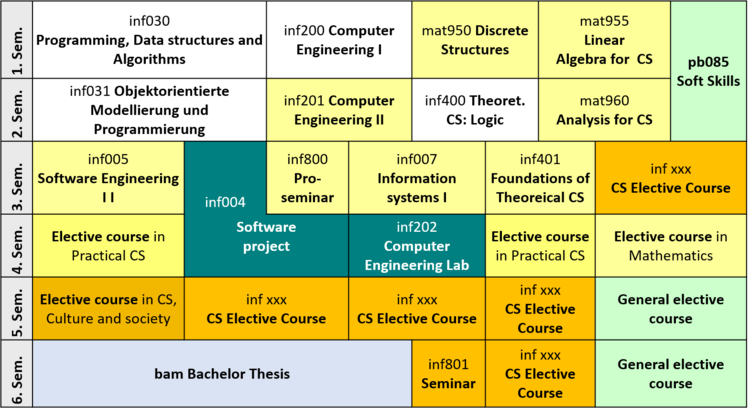The study plan of the Bachelor of Computer Science shows that all our basic modules are also relevant for practical applications:
The mathematics modules (discrete structures, analysis, linear algebra, special mathematics (= numerics, analysis II or statistics) as well as the basics of theoretical computer science (logic, formal languages and automata,...) are strongly foundation-oriented modules.
- Mathematics not only provides formalisms that we urgently need in computer science to be able to express ourselves precisely and concisely. It also exercises logically structured and abstract thinking.
- The theoretical modules are a basis, for example, for circuit design, i.e. technical computer science, but also for programming languages (practical computer science) and many other applications.
- The two modules on technical computer science deal with how computers are constructed and which aspects need to be considered in hardware design. This is practically underpinned by the practical course in Computer Engineering in the 4th semester, where a small hardware design is actually run through, Lego Mindstorms robots are programmed, a little soldering is done and more.
The Practical Computer Science modules first provide a solid foundation in software development:
- In the the moudles Programming, data structures (PDA) and algorithm and Object-orientes Programming and Modeling (OMP), students learn a programming language (currently Java) but also about different types of programming languages and their general concepts.After these modules and some programming experience, all our students should be able to teach themselves new programming languages (because they know what matters). Besides the topic Algorithms and Data Structures helps students to understand the complexity of programs: Porgrams should be processed efficiently and should also not require too much memory.
- In Software Engineering module students learn how to structure a large software project with many participants so that it is completed successfully and on time.
- Programming on a small scale (PDA and OMP) and on a large scale (software technology) is applied in the one-year software project , where a moderately difficult task is solved in a team of students. Here you also apply techniques that were taught in the Soft Skills module (see below).
The purpose of the other practical modules can already be seen from their names:
- Information Systems: In most applications, the appropriate storage of information in databases is an important functionality in a software system.
- and in the elective area „Pracical Computer Science”:
- Operating systems: Without them, a computer would not run. But how do they work?
- Computer networks: who would want to do without them (is there life without the Internet)? How do computer networks work at all? How is information transmitted? What problems can occur?
- Internet Technologies: Programming languages and technologies to script interactive web pages
The professionalisation area gives our students the opportunity to acquire interdisciplinary competences. The modules
- Soft Skills, in which students have the opportunity to become more aware of and specifically expand their general skills, attitudes and knowledge elements, so-called key competencies, and
- Informatics and Society, which encourages students to reflect on the changes brought about by information technology.
are firmly anchored in the study plan of the degree programme as an urgent recommendation.
All other topics and courses can be chosen according to personal interest, i.e.
- those who want to work more "hands-on" choose internships,
- those who want to do more independent work and research choose many seminars,
- those who want to know more about the theoretical background, modules from theoretical computer science, etc.
- Those who want to learn something specifically about an application area choose the appropriate modules (possibly from a specialisation).
You can also choose the topic of your Bachelor's thesis and seminars according to your individual interests. How practice-oriented a study programme becomes is therefore largely up to each student after studying the basic and advanced modules, although we support our students by offering specialisations as well as mentoring and study guidance.
All of our lectures are accompanied by exercises in which you are regularly asked to solve tasks related to the lecture material in a team. This makes it easier to engage creatively with the lecture content and thus understand it better.
And last but not least: We give many of our students the opportunity to work on projects as student assistants during their studies. Our research institute OFFIS, many regional companies and other areas within the university also offer many jobs for computer science students.
The opportunity to actually work practically on concrete research and application-oriented problems (and to gain experience and earn money in the process) is also taken advantage of by about 70% of our students.


